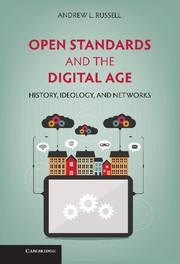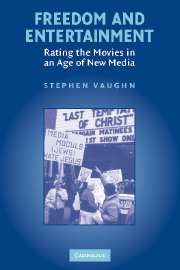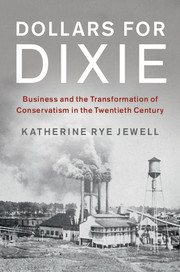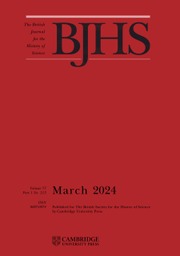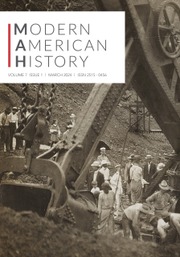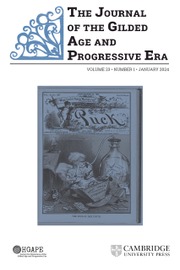Open Standards and the Digital Age
History, Ideology, and Networks
£77.99
Part of Cambridge Studies in the Emergence of Global Enterprise
- Author: Andrew L. Russell, Stevens Institute of Technology, New Jersey
- Date Published: July 2014
- availability: Available
- format: Hardback
- isbn: 9781107039193
£
77.99
Hardback
Other available formats:
Paperback, eBook
Looking for an inspection copy?
This title is not currently available on inspection
-
How did openness become a foundational value for the networks of the twenty-first century? Open Standards and the Digital Age answers this question through an interdisciplinary history of information networks that pays close attention to the politics of standardization. For much of the twentieth century, information networks such as the monopoly Bell System and the American military's Arpanet were closed systems subject to centralized control. In the 1970s and 1980s however, engineers in the United States and Europe experimented with design strategies to create new digital networks. In the process, they embraced discourses of 'openness' to describe their ideological commitments to entrepreneurship, technological innovation, and participatory democracy. The rhetoric of openness has flourished - for example, in movements for open government, open source software, and open access publishing - but such rhetoric also obscures the ways the Internet and other 'open' systems still depend heavily on hierarchical forms of control.
Read more- Offers a rigorous, original, and critical interpretation of the origins of the Internet and the information age
- Provides the first history of American communication and information technology to focus on standardization, with a clear description of where standards come from and how they are a central element of American political economy and global business
- Includes historical analysis that brings a fresh perspective to policy debates over the globalization of Internet governance
Reviews & endorsements
'This book contributes significantly to our understanding of the current state of affairs in information technology and governance, while also making original contributions to our understanding of the evolution of business institutions across the long twentieth century. Drawing on substantial original research, Andrew L. Russell argues that processes for setting industry standards have embodied broadly felt (and often competing) values regarding American governance. … In the process, we come to see how the current enthusiasm for open systems and standards fits in a larger story of American governance. The current situation is neither a radical break nor an idealized state, as much contemporary literature insists and celebrates. Rather, it is a refinement in the face of shifting economic conditions that reflects and draws on a persistent commitment to economic liberalism. This is an important point that will garner considerable attention from historians and contemporary business analysts.' Steven W. Usselman, Chair of the School of History, Technology and Society, Georgia Institute of Technology
See more reviews'Andrew L. Russell's book describes how we got to the twenty-first-century information society, the 'Open World', through focusing a standardization lens on the history of American communication and information technology as it evolved from the late nineteenth century. Russell's book is the first history of American communication and information technology to focus on standardization and its processes and implications. Understanding how standardization has evolved is critical to understanding our commercial world today, and Russell provides a key contribution by exploring its evolution in the realm of ICTs. … a real contribution to the literature. He also adds to the field by showing that the notions and values of open standards, open systems, and the Open World have a long prehistory.' JoAnne Yates, Sloan Distinguished Professor of Management and Professor of Managerial Communication and Work and Organization Studies, Massachusetts Institute of Technology Sloan School of Management
'This book is a major contribution to both the history of the Internet and the role of technical standards. Russell deals with a set of complex issues, grounding these in the prior work of historians of technology, using language that makes this book accessible to a larger audience than just experts on the Internet or computing. Tightly argued and well informed, this book constitutes a major step forward in our understanding of three issues: how the Internet evolved, the role of technical standards in American communications, and the complexity and collaborative activities of diverse individuals and institutions. Russell provides a useful explanation of how the modern world acquired key components of its contemporary communications infrastructure. … this is an important book that deserves to be read by historians of computing, communications, modern technologies, business, post-1865 American society, and by those concerned with our current governance of technological issues.' James W. Cortada, The American Historical Review
'Open Standards and the Digital Age is a densely written book based on a significant number of primary sources and a rich, multidisciplinary bibliography. Andrew L. Russell paints on a big canvas, but … summary sections for each chapter, as well as the introduction and conclusion chapters, bring the main threads together to provide a refreshing view on the history of the early communications networks, and particularly of the more recent digital ones.' Dov Lungu, Isis
Customer reviews
Not yet reviewed
Be the first to review
Review was not posted due to profanity
×Product details
- Date Published: July 2014
- format: Hardback
- isbn: 9781107039193
- length: 326 pages
- dimensions: 231 x 157 x 25 mm
- weight: 0.65kg
- contains: 8 b/w illus. 3 tables
- availability: Available
Table of Contents
1. Introduction
2. Ideological origins of open standards I: telegraph and engineering standards, 1860s–1900s
3. Ideological origins of open standards II: American standards, 1910s–30s
4. Standardization and the monopoly Bell System, 1880s–1930s
5. Critiques of centralized control, 1930s–70s
6. International standards for the convergence of computers and communications, 1960s–70s
7. Open systems and the limits of democratic design, 1970s–80s
8. The Internet and the advantages of autocratic design, 1970s–90s
9. Conclusions: open standards and an open world.
Sorry, this resource is locked
Please register or sign in to request access. If you are having problems accessing these resources please email [email protected]
Register Sign in» Proceed
You are now leaving the Cambridge University Press website. Your eBook purchase and download will be completed by our partner www.ebooks.com. Please see the permission section of the www.ebooks.com catalogue page for details of the print & copy limits on our eBooks.
Continue ×Are you sure you want to delete your account?
This cannot be undone.
Thank you for your feedback which will help us improve our service.
If you requested a response, we will make sure to get back to you shortly.
×
